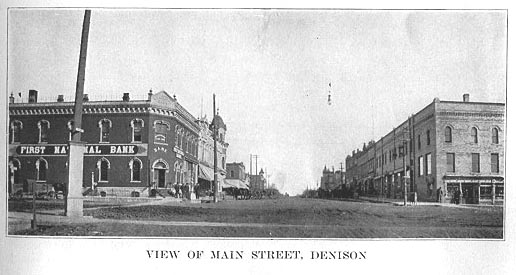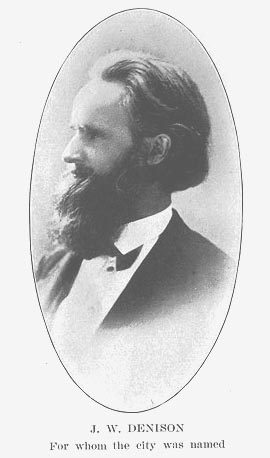A Photo of Main Street, Denison, in the 1911 History
Denison is Founded to Make a Profit
Before Denison was located, Crawford county had been settled for five or six years. There was a flourishing community at Mason's Grove, a little store had been established at what is now Deloit, and along the Boyer at that place there were a saw-mill and a grist-mill. There were settlements in the groves along the creeks and rivers; at Dunham's Grove, on the East Boyer, at Coon Grove, in the southwest part of the county; and at Three Bee Tree Grove. There was also what was later known as Fort Purdy, in what was called the Burnt Woods. All these had been established before the town of Denison had its inception.
Denison did not grow from the natural selection of the settlers themselves, as did Deloit and Old Kiron, and Dow City, but its location was arbitrarily fixed by the representative of a company of eastern capitalists.
The Providence Western Land Company, was formed in the fall of 1855 as a result of the promotion efforts of Mr. J. W. Denison. He interested a large number of men in the city of Providence, Rhode Island, and through his efforts the company was formed. The government had given the surviving veterans of the war of 1812 and of the war with Mexico the right to preempt one hundred and sixty acres, each, of the unoccupied lands in western states. These veterans had the right to dispose of these lands and many sold their land warrants at sixty cents per acre.
It was the purpose of this company to get these old soldiers to file upon lands in a body, and then to purchase the land from them. Fifty-one thousand dollars was raised for this purpose and the claims were filed and the money used to purchase lands, Crawford and Harrison counties being selected as the scene of activities for the company.
It was evidently the same old story, by which the lands of a score of states have been exploited by pretentious advertising, by flamboyant circulars, and by rather rash promises of quick and golden returns.
After the purchase of the original tract of land it became necessary to found a town. The present site of Denison was chosen with considerable foresight. From J. W. Denison's own words in 1875 on the founding of Denison we read " After a careful survey of the field, thro' central, southern and western Iowa, it was decided to pitch our tent, permanently, in Crawford county, being central in location and sufficiently distant from any place of importance to give room for healthful growth, while the soil, streams and timber gave evidence of value equal to any, and far exceeding many of the counties in the State. The four diagonal points of notice, of which this was the center, were Council Bluffs, 65 miles southwest of us; Sioux City, 75 miles northwest; Des Moines, 100 miles southeast; and Ft. Dodge, 75 miles northeast. A state road from Des Moines to Sioux City ran through this county, as did also a road from Council Bluffs to Ft. Dodge; and a dotted line on the maps of that day indicated the line of railroad some day, east and west through the center of this tier of counties, which is the exact center line of the State to a mile. "
" It was in this vacant center that we pitched our tent, at the junction of the Boyer rivers, for the proposed town site, within one mile and a half of the geographical center of the county, and secured some twenty thousand acres of land in its vicinity for the farming interests. As the county seat was not yet located, it was but natural that we should suggest to the locating commissioners appointed by the District Judge, that they consider the merits of this point among others, as the one designed by nature for the shire town of the county. They did so, and as the result the county seat was located where it has since remained and doubtless will continue, as long as the Boyer remains. This was in the spring of 1856, and in the same spring was that memorable Land Grant of Congress for aiding in the construction of four railroads through the State east and west, and one of them 'to run on the parallel of 42 degrees as near as practicable to the Missouri river.' As this line was directly through the center of Crawford county it was but natural to conclude that we were in luck - that we were 'in town.'"
J. W. Denison's Foresight
Consequently, the new county seat would be located there in the center of the county on the forks of the Boyer and the East Boyer, affording the timber for fuel and for building, which was essential in those days, on a proposed transcontinental railroad line, and in almost equidistant trading distance from Council Bluffs, Sioux City, Fort Dodge, and Des Moines.
J. W. Denison, who acted as the agent of the Providence Western Land Company in all these matters, was something of an idealist and a dreamer, as men who conceive large projects must be. It is very possible that in his mind's eye he saw the Denison that was pictured, the busy streets and warehouses, the commerce carried upon the waters of the Boyer. Be that as it may, he came to this section of Iowa with the intent not only to purchase this large tract of land, but also to found a city. It must be conceded that he approached the matter with much good judgment and foresightedness.
Through his direction the beautiful courthouse square was selected and it, together with the courthouse building, was donated to the county upon the selection of this as the county seat. Parks were laid out, a market square was provided in the original plat, and the streets were wide, and for the most part well laid out. The fact that Denison was a well advertised, well known and well established village long before all the towns which we might mention in this part of Iowa, was due to the work of J. W. Denison and the Providence Western Land Company.
Denison Gets Its Name from Mrs. John Bassett
More of J. W. Denison's own words in 1875 about the naming of Denison " By the way, the incident that resulted in the naming of the town might interest some inquisitive ones upon that topic. It was this: The commissioners having decided upon the location, and returned to the house of the County Judge (John R. Bassett) for making out their report to the District Judge, had gone on with their preamble to the point of describing the location, and saying, 'Its name shall be-' at this point they stopped and began to suggest names."
" Finally, Mrs. Bassett, an invalid lady, confined to her bed and for years unable to walk, spoke up and said, 'Why not call it Denison?' 'Denison?' said they, 'yes, that is the name,' and immediately completed the sentence-'and its name shall be Denison.'"
"To that much esteemed lady, therefore, Mrs. Bassett, who is still the same invalid, with the same Christian spirit of meekness that these twenty years have since witnessed, belongs the honor of naming the county seat of her adopted county; and the Judge, her devoted husband, who was the chosen executive for six or eight years, still remains an honored servant to witness the growth of the town and of the county from the cradle to the beginning of manhood - the former from blank to a population of 1,200, the latter from 200 to 7, 000 with every indication of increase beyond any of his most favorite dreams."
J. W. Denison Writes About Mason's Grove
"There was with me in that early day R. W. Calkins, of Rock Island, Ill., who rambled with me days and nights over the bleak prairies, that dreary fall and winter; and when we brought up in this country we made our headquarters at Father Dobson's in Mason's grove, now Deloit, a town of his own making, and who, at that time, had the only saw and flouring mill within the distance of from forty to sixty miles in any direction, and the burr-stones of which he was said to carry in his side pockets to his house for dressing! When completed they would turn out from three to ten bushels of corn a day for the weary farmer who had hauled it for thirty or forty miles for that early staff of life-the gist of 'hog and hominy'.
"




